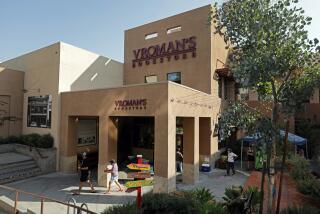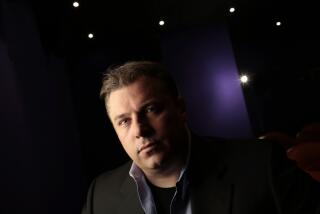A Priest 50 Years, Greeley Is Still Going Strong
On his way to the cafe cashier with a ham-and-cheese croissant in one hand and a bottle of iced tea in the other, Father Andrew Greeley was beckoned to a table by a lunch group at the Cathedral of Our Lady of the Angels.
“Are you Andrew Greeley?” a priest asked tentatively.
Yes, Greeley said.
“I thought it was you,” the priest said enthusiastically.
A woman at the table joined the conversation. “I’ve read every one of your novels,” she gushed.
Greeley smiled. His latest was just off the press. “It’s the best yet,” he told her. After a few pleasantries, he went outdoors to the cathedral plaza to eat his lunch.
Half an hour later, the woman approached him for his autograph. Minutes later Cardinal Roger M. Mahony, who had heard that Greeley was on the site, walked across the plaza to welcome him to the cathedral.
Not a bad reception for a simple priest.
Of course, Greeley is no simple priest. Sociologist, professor, journalist, millionaire author -- and at times biting critic of the nation’s Roman Catholic bishops -- Greeley is observing his 50th anniversary in the priesthood this month.
Some in the church think he is slowing down, and has lost his edge, at age 76. They speak fondly of his early and middle years when the Chicago Irish American priest undertook groundbreaking sociological studies about the church and wrote bestsellers such as “The Cardinal Sins.”
That may be, but Greeley has just published two new nonfiction sociological studies about priests. The new novel, “The Priestly Sins,” is about a young cleric whose career is nearly destroyed because he witnesses and reports the sexual abuse of a boy by a fellow priest.
Greeley continues working as a professor of sociology at the University of Arizona and as a research associate with the National Opinion Research Center at the University of Chicago.
After he was ordained in 1954, his first -- and last -- parish assignment was at Christ the King in Chicago. In 1965, then-Cardinal Gregory Meyer assigned him to work full time as a writer, researcher and teacher. Greeley has been doing that ever since.
He has written more than 100 nonfiction works and 50 novels. But his publishing success made him a self-described “permanent outsider” in the church he loves.
His outspokenness and his novels’ graphic sexual content have raised eyebrows in Rome, alienated two successive cardinal archbishops of Chicago, and angered fellow priests, even as he won a large following among everyday Catholics. Readers write him all the time, he said, telling him that his books have brought them back to the church.
“They get it,” Greeley said, adding that many priests and bishops still don’t.
“They say Andy’s writing it to make money, that these [novels] are potboilers, trash designed to make the author money.” Greeley’s Irish is up. “Blarney!”
His sociological work documented that rank-and-file Catholics were ignoring the ban on artificial birth control. He reported that most Catholics wanted a more democratic church, with the election of local bishops by priests and laity, and supported the ordination of women and married men.
As early as 1986, Greeley began writing forcefully about sexual abuse of minors, and he has repeatedly hammered bishops for failing to stop the abuse and covering up for pedophile priests.
At the time, priests told him that it wasn’t true and that even if it was, he shouldn’t air dirty laundry.
Despite progress in ending abuse, Greeley complains, the hierarchy still abets denial and secrecy.
Greeley also jabs at other current issues, as when he took on a Vatican cardinal last week who said Sen. John Kerry, a Catholic and the presumptive Democratic presidential nominee, should be denied Communion because he supports a woman’s right to an abortion.
“OK,” Greeley said during an interview in Los Angeles, “are we going to deny Communion to those who supported the Iraqi war? Are we going to deny Communion to those who support the death penalty?” he asked, noting the church’s opposition to both. “It’s a very peculiar exercise of ecclesiastical power. Or, as I sometimes say, there are different rules for Republicans.”
But Greeley is known best for his novels.
“His reputation had always been that he wrote these novels that may be -- what’s the word they use? Steamy! They had a lot of sex in them,” said June Rosner, who has been Greeley’s publicist for 23 years.
In 1986, the late Cardinal Joseph Bernardin of Chicago turned down Greeley’s pledge of $1 million for Catholic schools and scholarships. Greeley said Bernardin didn’t want any trouble from Rome.
Indeed, Greeley said the Vatican urged Bernardin to set up a secret commission to investigate his novels.
Greeley said he never thought the novels were nearly as steamy as some believed. He called them “theological novels,” offering insights into the mystery, culture and politics of the church, along with inspiration.
Tomas W. Roberts, editor of the independent National Catholic Reporter newspaper, said Greeley’s novels had served the church.
“There is a certain truth-telling that goes on in his novels that mirrors the kind of truth-telling he has brought to the church as a social scientist. That was a dramatically new thing for the church when he was doing his work early on,” Roberts said. “He made us face real facts.”
Before Bernardin’s death in 1996, the two men reconciled, and the Chicago Archdiocese has accepted Greeley’s contributions. He has also given hundreds of thousands of dollars more to his seminary and additional donations to Catholic schools.
Greeley still has his critics, however, among them William Donohue, president of the Catholic League for Religious and Civil Rights.
“I regard him as a man who’s gotten increasingly embittered as he’s aged. Unfortunately, his finest hour in terms of his contribution to scholarship is when he was middle-aged,” Donohue said.
For a long time, Greeley said, he was saddened by such animosity. No longer.
“I am still an outsider,” he said. “But now I understand marginality is a great asset ... because of the freedom that comes with marginalization.”
Despite his outspoken views, Greeley has not embraced every “reform” advanced by liberals. Advocates of optional celibacy as a solution to the sexual abuse crisis, he said, fail to understand the nature of sexual pathology. And a married clergy, as in Protestant churches, presents its own problems.
He laments that Gregorian chant is not heard more often and that the church has de-emphasized some distinctive Catholic traditions.
“We have given up too readily too much: the saints, the angels, the souls in purgatory,” he said.
Greeley said all the talk of his “blurred” identity hadn’t obscured the central fact of his life, one that Rosner said was illustrated by an encounter Greeley had with a young mother who was six months pregnant.
Greeley was waiting in an office lobby several years ago when she asked him to bless her unborn child. “I knew instantly what the mother wanted and I did it,” he said. He placed his hand on her stomach and prayed.
“I’m a priest,” Greeley said this week. “I’m a priest that does a lot of other things.... That may blur it for others, but I’m pretty clear. I’m a priest.”
More to Read
Sign up for our Book Club newsletter
Get the latest news, events and more from the Los Angeles Times Book Club, and help us get L.A. reading and talking.
You may occasionally receive promotional content from the Los Angeles Times.






